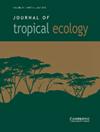Estimation of the number of tree species in French Guiana by extrapolation of permanent plots richness
IF 1
4区 环境科学与生态学
Q4 ECOLOGY
引用次数: 0
Abstract
The biodiversity of tropical rainforest is difficult to assess. Yet, its estimation is necessary for conservation purposes, to evaluate our level of knowledge and the risks faced by the forest in relation to global change. Our contribution is to estimate the regional richness of tree species from local but widely spread inventories. We reviewed the methods available, which are nonparametric estimators based on abundance or occurrence data, log-series extrapolation and the universal species–area relationship based on maximum entropy. Appropriate methods depend on the scale considered. Harte’s self-similarity model is suitable at the regional scale, while the log-series extrapolation is not. GuyaDiv is a network of forest plots installed over the whole territory of French Guiana, where trees over 10 cm DBH are identified. We used its information (1315 species censused in 68 one-hectare plots) to estimate the exponent of the species–area relationship, assuming Arrhenius’s power law. We could then extrapolate the number of species from three local, wide inventories (over 2.5 km通过永久地块丰富度外推法估算法属圭亚那的树种数量
热带雨林的生物多样性很难评估。然而,出于保护目的、评估我们的知识水平以及森林在全球变化中面临的风险,有必要对其进行评估。我们的贡献在于从当地但分布广泛的清单中估算出区域树种的丰富程度。我们回顾了现有的方法,包括基于丰度或出现数据的非参数估计法、对数序列外推法和基于最大熵的通用物种-面积关系法。合适的方法取决于所考虑的尺度。哈特的自相似模型适用于区域尺度,而对数序列外推法则不适用。GuyaDiv 是一个遍布法属圭亚那全境的森林地块网络,对 DBH 超过 10 厘米的树木进行识别。我们利用其信息(在 68 块一公顷的地块上普查了 1315 个物种),假设阿伦尼斯的幂律,估算出物种与面积关系的指数。这样,我们就可以推断出三个地方性大范围普查(超过 2.5 平方公里)的物种数量。我们估算出全境的树种数量约为 2200 种。
本文章由计算机程序翻译,如有差异,请以英文原文为准。
求助全文
约1分钟内获得全文
求助全文
来源期刊

Journal of Tropical Ecology
环境科学-生态学
CiteScore
2.10
自引率
0.00%
发文量
44
审稿时长
18-36 weeks
期刊介绍:
Journal of Tropical Ecology aims to address topics of general relevance and significance to tropical ecology. This includes sub-disciplines of ecology, such as conservation biology, evolutionary ecology, marine ecology, microbial ecology, molecular ecology, quantitative ecology, etc. Studies in the field of tropical medicine, specifically where it involves ecological surroundings (e.g., zoonotic or vector-borne disease ecology), are also suitable. We also welcome methods papers, provided that the techniques are well-described and are of broad general utility.
Please keep in mind that studies focused on specific geographic regions or on particular taxa will be better suited to more specialist journals. In order to help the editors make their decision, in your cover letter please address the specific hypothesis your study addresses, and how the results will interest the broad field of tropical ecology. While we will consider purely descriptive studies of outstanding general interest, the case for them should be made in the cover letter.
 求助内容:
求助内容: 应助结果提醒方式:
应助结果提醒方式:


